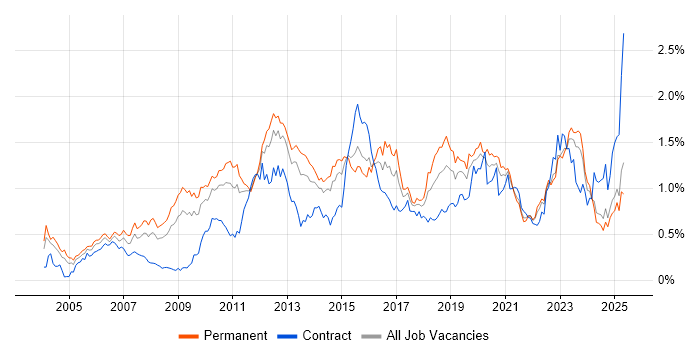High Availability
England > Midlands
The table below provides summary statistics for permanent job vacancies advertised in the Midlands requiring High Availability skills. It includes a benchmarking guide to the annual salaries offered in vacancies that cited High Availability over the 6 months leading up to 31 May 2025, comparing them to the same period in the previous two years.
| 6 months to 31 May 2025 |
Same period 2024 | Same period 2023 | |
|---|---|---|---|
| Rank | 206 | 227 | 199 |
| Rank change year-on-year | +21 | -28 | +69 |
| Permanent jobs citing High Availability | 54 | 98 | 116 |
| As % of all permanent jobs advertised in the Midlands | 0.78% | 0.76% | 1.33% |
| As % of the Processes & Methodologies category | 0.85% | 0.95% | 1.37% |
| Number of salaries quoted | 22 | 89 | 77 |
| 10th Percentile | £46,300 | £31,250 | £34,949 |
| 25th Percentile | £53,750 | £37,500 | £41,895 |
| Median annual salary (50th Percentile) | £71,250 | £47,500 | £57,500 |
| Median % change year-on-year | +50.00% | -17.39% | +5.98% |
| 75th Percentile | £75,000 | £61,250 | £77,500 |
| 90th Percentile | £79,875 | £88,750 | £80,000 |
| England median annual salary | £65,000 | £57,500 | £65,000 |
| % change year-on-year | +13.04% | -11.54% | +12.44% |
All Process and Methodology Skills
Midlands
High Availability falls under the Processes and Methodologies category. For comparison with the information above, the following table provides summary statistics for all permanent job vacancies requiring process or methodology skills in the Midlands.
| Permanent vacancies with a requirement for process or methodology skills | 6,329 | 10,318 | 8,446 |
| As % of all permanent jobs advertised in the Midlands | 91.57% | 80.22% | 96.53% |
| Number of salaries quoted | 2,518 | 7,406 | 4,404 |
| 10th Percentile | £27,000 | £26,250 | £29,750 |
| 25th Percentile | £33,000 | £35,000 | £38,357 |
| Median annual salary (50th Percentile) | £48,000 | £47,500 | £52,500 |
| Median % change year-on-year | +1.05% | -9.52% | +5.00% |
| 75th Percentile | £63,750 | £62,200 | £67,500 |
| 90th Percentile | £75,000 | £75,000 | £77,500 |
| England median annual salary | £57,500 | £55,000 | £62,500 |
| % change year-on-year | +4.55% | -12.00% | +4.17% |
High Availability
Job Vacancy Trend in the Midlands
Job postings citing High Availability as a proportion of all IT jobs advertised in the Midlands.

High Availability
Salary Trend in the Midlands
3-month moving average salary quoted in jobs citing High Availability in the Midlands.
High Availability
Salary Histogram in the Midlands
Salary distribution for jobs citing High Availability in the Midlands over the 6 months to 31 May 2025.
High Availability
Job Locations in the Midlands
The table below looks at the demand and provides a guide to the median salaries quoted in IT jobs citing High Availability within the Midlands region over the 6 months to 31 May 2025. The 'Rank Change' column provides an indication of the change in demand within each location based on the same 6 month period last year.
| Location | Rank Change on Same Period Last Year |
Matching Permanent IT Job Ads |
Median Salary Past 6 Months |
Median Salary % Change on Same Period Last Year |
Live Jobs |
|---|---|---|---|---|---|
| West Midlands | +23 | 37 | £75,000 | +42.86% | 30 |
| East Midlands | +30 | 15 | £48,500 | +7.78% | 11 |
| High Availability England |
|||||
High Availability
Co-occurring Skills and Capabilities in the Midlands by Category
The follow tables expand on the table above by listing co-occurrences grouped by category. The same employment type, locality and period is covered with up to 20 co-occurrences shown in each of the following categories:
|
|
||||||||||||||||||||||||||||||||||||||||||||||||||||||||||||||||||||||||||||||||||||||||||||||||||||||||||||||||||||||||||||||
|
|
||||||||||||||||||||||||||||||||||||||||||||||||||||||||||||||||||||||||||||||||||||||||||||||||||||||||||||||||||||||||||||||
|
|
||||||||||||||||||||||||||||||||||||||||||||||||||||||||||||||||||||||||||||||||||||||||||||||||||||||||||||||||||||||||||||||
|
|
||||||||||||||||||||||||||||||||||||||||||||||||||||||||||||||||||||||||||||||||||||||||||||||||||||||||||||||||||||||||||||||
|
|
||||||||||||||||||||||||||||||||||||||||||||||||||||||||||||||||||||||||||||||||||||||||||||||||||||||||||||||||||||||||||||||
|
|
||||||||||||||||||||||||||||||||||||||||||||||||||||||||||||||||||||||||||||||||||||||||||||||||||||||||||||||||||||||||||||||
|
|
||||||||||||||||||||||||||||||||||||||||||||||||||||||||||||||||||||||||||||||||||||||||||||||||||||||||||||||||||||||||||||||
|
|
||||||||||||||||||||||||||||||||||||||||||||||||||||||||||||||||||||||||||||||||||||||||||||||||||||||||||||||||||||||||||||||
|
|
||||||||||||||||||||||||||||||||||||||||||||||||||||||||||||||||||||||||||||||||||||||||||||||||||||||||||||||||||||||||||||||
